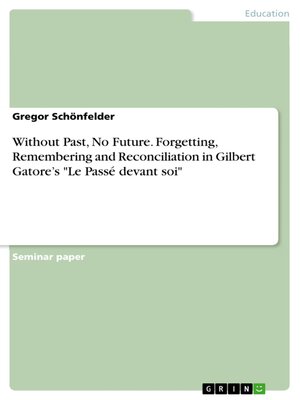Without Past, No Future. Forgetting, Remembering and Reconciliation in Gilbert Gatore's "Le Passé devant soi"
ebook
By Gregor Schönfelder

Sign up to save your library
With an OverDrive account, you can save your favorite libraries for at-a-glance information about availability. Find out more about OverDrive accounts.
Find this title in Libby, the library reading app by OverDrive.



Search for a digital library with this title
Title found at these libraries:
| Library Name | Distance |
|---|---|
| Loading... |
Seminar paper from the year 2014 in the subject Didactics for the subject English - Literature, Works, grade: 1.3, University of Tubingen (English Department), course: Visions of the Future, Shadows of the Past: Contemporary Issues in African Literature, language: English, abstract: 20 years ago, in 1994, the otherwise largely ignored little Central African country of Rwanda made the international headlines by making the world witness its most recent genocide to date. The countries two major ethnic groups, Hutu and Tutsi, had a long history of violence with recurring mutual massacres. Following the downing of the plane carrying Rwanda's president Habyarimana, Hutu militias took control and together with the ordinary population tried to wipe out the Tutsi in countrywide government-sponsored massacres that exceeded previous massacres in quantity and quality. Post-genocide Rwandan society, and therefore its government, faces a very precarious situation: how to rebuild a society in which there are more perpetrators than victims and in which the crimes where largely conducted by the ordinary population? Perhaps the biggest problem faced is that at their core the massacres were hate crimes as opposed to massacres for practical reasons, say, to get more land. One of the country's most pressing issues is therefore reconciliation between these two groups over the past conflicts. The Tutsi-led government has decided to tackle this complex problem by simple means: officially abolishing ethnicities and encouraging Tutsi survivors to forgive Hutu perpetrators. However, as noble and well-meaning this approach seems at first glance, the negative implications might far outweigh the positive ones in the long run, which will be discussed in detail further below. Many non-fictional papers have dealt with the phenomenon of "collective amnesia", yet a surprisingly small number of fictional works has done so, making the few existing ones the more valuable. This paper is going to use one of these fictional works, Gilbert Gatore's novel "Le Passé devant soi" (The Past Ahead), as an example to show why and how to challenge the approach of imposed silence as a means to deal with ethnic divides in post-genocide Rwanda, which lead to " striking continuity from the pre-genocide to the post-genocide regime" (Reyntjens 32). There are three main problems with the government's approach, each of which is dealt with in the novel: the whole issue of reinventing a nation, the consequences of this for the survivors, and the precarious situation perpetrators are put into. We will look at each of these problems in turn while constantly integrating how "Le Passé devant soi" criticises in the current politics of commemoration.







